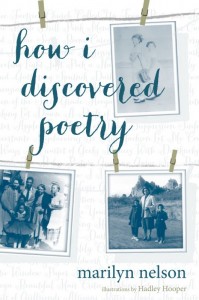"Bomb Drill
(Lackland AFB, Texas, 1952)
Nothing belongs to us in our new house
except Mama's piano and our clothes.
I'm the new girl in Dick and Jane country,
the other children faceless as grown-ups.
I read through recess and take some books home.
I read to Jennifer while Mama plays.
I read while the television talker
talks about career and the hide drajen bomb.
Mama says she's going to vote for Ike.
Daddy says, 'Woman, you just think he's cute!'
We ducked and covered underneath our desks,
hiding from drajen bombs in school today.
Maybe drajens would turn into butter
if they ran really fast around a tree."
Marilyn Nelson spent the nineteen-fifties -- from age four to age fourteen
-- living at a never-ending series of U.S. military bases with her parents
and her younger sister. In the classroom, she was so often the "one bay
in a room full of palominos."
During these years of the Civil Rights Movement, her parents speak of
Emmett and Rosa and other pivotal events taking place in the country. The
focus of the fifty unrhymed sonnets in HOW I DISCOVERED POETRY flows from the
hopes, prayers, dreams and fears of a little girl, and the thoughts and
actions of a growing and well-read black tween who is learning not to put up
with the racism that so often bubbles to the surface, a young woman who sees
herself, maybe, as a budding poet.
"Queen of the Sixth Grade
(Kittery Point, Maine, 1958)
There was an accident in school today.
I shudder when I remember the crunch
of tibia and fibula and wood
as Jamie tried to get off the seesaw
and got her forearm accidentally
caught under her own weight and the up-kick
on the other end, increased the force
Ellie and I used pushing her end down
so her seesaw seat slammed the blacktop hard
two or three times before she realized
what a mistake it was to say that name
she learned in some civilian school down South
before they got transferred and she came here
to this school, where I'm Queen of the Sixth Grade."
The uniqueness of the 1950s setting -- both the ever-changing military
bases that the young girl calls home, and the fact that she is growing up the
daughter of "one of the first African American career officers in the Air
Force," as well as the power of the poetic form employed here, make this a
unique tale among the many excellent books out there about the Civil Rights
Movement era.
112 pages 978-0-8037-3304-6 Ages 12 and up
Recommended by: Richie Partington, MLIS, Librarian, California USA
Richie's Picks _https://richiespicks.com_ (https://richiespicks.com/)






